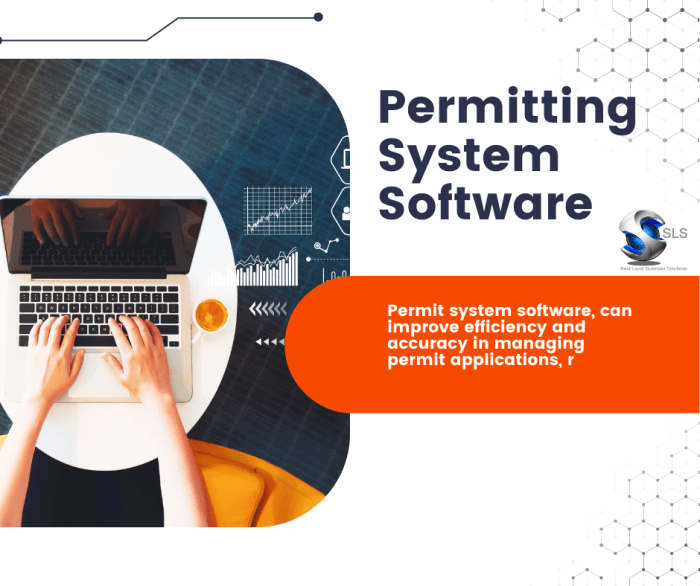Kicking off with Smart Tools for Permit Tracking Around the World, this comprehensive overview delves into the realm of utilizing technology to streamline permit tracking processes globally. From improving accuracy to enhancing speed, these tools play a pivotal role in efficient permit management.
Overview of Smart Tools for Permit Tracking

The concept of smart tools for permit tracking involves utilizing technology to streamline and automate the process of tracking permits for various projects and activities. This includes the use of digital platforms, software, and applications to monitor the status of permits, deadlines, and compliance requirements.Using technology for efficient permit tracking is crucial in ensuring that projects are completed on time and within legal regulations.
It helps in reducing paperwork, minimizing errors, and improving communication between stakeholders involved in the permitting process.
Examples of Smart Tools for Permit Tracking
- Permit Management Software: This type of software allows users to centralize permit information, track application status, and receive notifications for upcoming deadlines.
- GIS Mapping Tools: Geographic Information System (GIS) mapping tools help in visualizing permit data on maps, making it easier to identify permit locations and boundaries.
- Mobile Applications: Mobile apps enable users to access permit information on the go, submit applications digitally, and receive real-time updates on permit approvals or rejections.
- Online Permit Portals: Online portals provide a platform for applicants to apply for permits, pay fees online, and track the progress of their permit applications.
Benefits of Smart Tools for Permit Tracking
Smart tools for permit tracking offer various benefits that improve the efficiency and effectiveness of the permit management process. These benefits include enhanced accuracy, faster processing, and improved organization of permits.
Improved Accuracy in Tracking Permits
Smart tools utilize automation and digital functionalities to accurately track permits throughout the entire process. By eliminating manual data entry and human errors, these tools ensure that the information related to permits is always up-to-date and precise. This accuracy reduces the chances of mistakes and delays in permit processing, leading to a more streamlined and reliable system.
Enhanced Speed of Permit Processing
One of the key advantages of smart tools for permit tracking is the significant improvement in processing times. By automating repetitive tasks, such as document verification and approval workflows, these tools expedite the entire permit application process. This increased speed not only benefits applicants by reducing waiting times but also allows organizations to handle a higher volume of permits efficiently.
Better Organization and Management of Permits
Smart tools provide a centralized platform for managing permits, making it easier to keep track of all permits in one place. This centralized system allows for seamless communication between different departments involved in the permit process, ensuring transparency and accountability.
Additionally, smart tools often include features such as reminders, notifications, and reporting tools, which help in maintaining organized records and efficient management of permits.
Features of Effective Permit Tracking Systems
Effective permit tracking systems are crucial for ensuring compliance with regulations and streamlining the approval process. These systems help organizations manage permits efficiently, reduce delays, and avoid costly fines. Key features that make a permit tracking system efficient include:
Data Centralization and Accessibility
Centralizing permit information in one system allows for easy access and retrieval of data. Users can quickly locate permit details, track progress, and ensure all necessary documents are in order.
Automated Notifications and Reminders
Automated notifications and reminders help keep stakeholders informed about upcoming deadlines, required actions, and changes in permit status. This feature ensures timely responses and prevents delays in the approval process.
Integration with GIS Mapping
Integrating permit tracking systems with Geographic Information System (GIS) mapping allows users to visualize permit locations, boundaries, and relevant spatial data. This feature enhances decision-making and helps identify potential conflicts or overlaps.
Real-time Reporting and Analytics
Real-time reporting and analytics provide insights into permit performance, trends, and areas for improvement. Users can generate custom reports, track key metrics, and make data-driven decisions to optimize the permit tracking process.
Compliance Monitoring and Auditing
Built-in compliance monitoring and auditing features help organizations ensure adherence to regulations, standards, and permit conditions. Users can conduct internal audits, identify non-compliance issues, and take corrective actions promptly.
Mobile Compatibility and Remote Access
Mobile compatibility and remote access allow users to manage permits on-the-go, submit applications electronically, and access permit information from anywhere. This feature increases efficiency, reduces paperwork, and accelerates the approval process.
Scalability and Customization
Scalable permit tracking systems can accommodate growing organizations, changing requirements, and new permit types. Customization options enable users to tailor the system to their specific needs, workflows, and reporting preferences.
Integration with Other Systems
Seamless integration with other systems such as project management tools, document management platforms, and accounting software enhances workflow efficiency and data accuracy. This feature eliminates manual data entry, reduces errors, and improves collaboration among teams.
Cost-effectiveness and ROI
Cost-effective permit tracking systems offer a high return on investment (ROI) by reducing administrative overhead, minimizing compliance risks, and speeding up the permit approval process. Organizations can save time and resources while ensuring regulatory compliance.
Case Studies of Successful Implementation

Implementing smart tools for permit tracking has proven to be successful in various countries and organizations, revolutionizing the way permits are managed and tracked efficiently.
Country A: Streamlining Permit Processes
Country A implemented a smart permit tracking system that digitized the entire permit application process, from submission to approval. This streamlined approach significantly reduced processing times and eliminated paperwork inefficiencies.
With real-time tracking and automated notifications, applicants were able to monitor the status of their permits, leading to improved transparency and accountability in the permit issuance process.
The outcomes were remarkable, with a drastic reduction in processing errors, quicker turnaround times, and increased overall satisfaction among stakeholders involved in the permit process.
Organization B: Enhancing Compliance Monitoring
Organization B, a regulatory body, adopted smart tools for permit tracking to enhance compliance monitoring and enforcement activities. By integrating geographical information systems (GIS) and data analytics, they were able to identify non-compliant activities and enforce regulations effectively.
The smart tools provided real-time insights into permit violations, enabling proactive enforcement actions to be taken promptly. This resulted in a significant increase in compliance rates and a reduction in unauthorized activities across regulated sectors.
Overall, the implementation of smart permit tracking tools by Organization B led to improved regulatory oversight, increased compliance, and a more efficient allocation of resources for monitoring and enforcement purposes.
Global Trends in Smart Tools for Permit Tracking
Smart tools for permit tracking have seen significant advancements globally, driven by technology innovations and the need for efficient and streamlined processes in permit management.
Integration of AI and Machine Learning
One of the latest trends in smart tools for permit tracking is the integration of artificial intelligence (AI) and machine learning algorithms. These technologies enable automated data analysis, identification of patterns, and prediction of permit processing times, leading to faster and more accurate permit approvals.
Mobile Applications for Permit Management
The rise of mobile applications tailored for permit tracking is another key trend. These apps provide real-time updates, notifications, and access to permit information on-the-go, enhancing communication between stakeholders and improving overall transparency in the permit process.
Cloud-Based Permit Tracking Systems
Cloud-based permit tracking systems have become increasingly popular due to their scalability, flexibility, and cost-effectiveness. These systems allow for remote access, secure data storage, and seamless collaboration among permit issuing authorities, applicants, and other involved parties.
IoT Integration in Permit Monitoring
The integration of Internet of Things (IoT) devices in permit monitoring is also a growing trend. IoT sensors and devices can provide real-time data on permit usage, compliance, and environmental impact, enabling better decision-making and enforcement of permit regulations.
Closure
In conclusion, Smart Tools for Permit Tracking Around the World offer a transformative approach to managing permits with precision and efficiency. Embracing these technological advancements can lead to enhanced organization and streamlined processes for permit tracking worldwide.
FAQ Overview
How do smart tools improve accuracy in tracking permits?
Smart tools utilize advanced algorithms and data analytics to ensure precise tracking of permits, minimizing errors and discrepancies.
What role does automation play in permit tracking systems?
Automation streamlines the permit tracking process by reducing manual tasks, increasing efficiency, and improving overall organization.
Are there any challenges associated with adopting smart tools for permit tracking globally?
Some challenges include initial implementation costs, data security concerns, and the need for training staff to effectively utilize these tools.
















